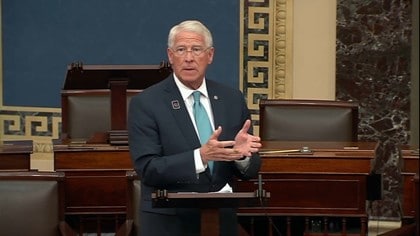U.S. Senator Roger Wicker, R-Miss., took to the Senate floor last week to urge his colleagues to pass a full defense appropriations package, which would include support for our nation’s troops. Wicker expressed his concern that another continuing resolution would delay development of new platforms and could cost defense programs nearly $20 billion in unnecessary spending.
Click here to watch the Senator’s remarks.
“We are under a continuing resolution, a CR, and it sounds so harmless,” Wicker said. “That is not true. Every defense expert in the government … will tell you that a continuing resolution is harmful to our nation’s defense. It not only sends the wrong signal, it has us sending money in the wrong direction and has us not spending money where we need to spend it.”
Wicker has joined calls from Senate leadership, including Senate Armed Services Committee Chairman Jim Inhofe, R-Okla., urging Congress to approve a full defense appropriations bill as the nation continues to confront growing threats from abroad.
“Iran is the largest state sponsor of terror, and it is on the warpath… Vladimir Putin’s Russia is in a shooting war against our partners in Ukraine. The Communist Government of China is brutalizing its own people on the streets of Hong Kong,” Wicker said.
“China has increased military spending by 83 percent over the last decade at a time when we can’t even agree on the funding for the current fiscal year we are in,” Wicker said.
The defense appropriations package would provide important support for the military, including funding for pay raises, training, housing, and upgraded equipment. Congressional Democrats have blocked consideration of the 2020 defense appropriations package twice, despite a bipartisan agreement setting defense and non-defense spending levels for the next two fiscal years.
“I am begging my colleagues, let’s fund our military, and let’s fund these future veterans who are serving on active duty right now. The current continuing resolution is doing real damage to our national security. It is harming the progress we have already made … It is harming our military men and women and making it harder for them to do their jobs going forward,” Wicker said.








